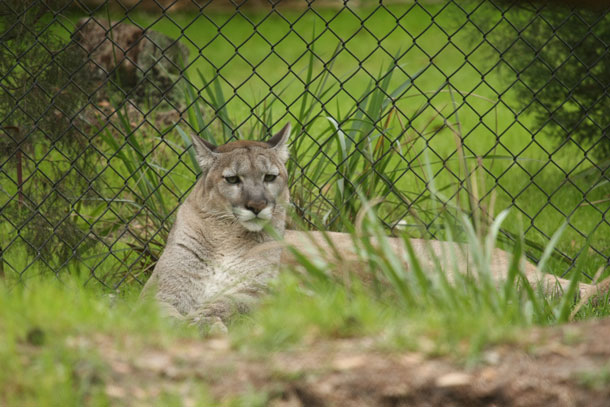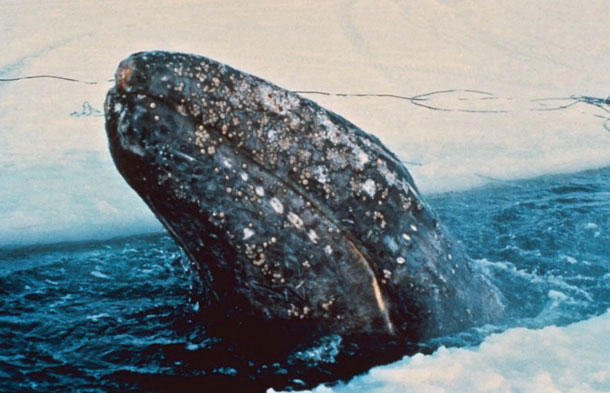Beyond The Headlines
Air Date: Week of October 26, 2018

The Florida Panthers (as in, the furry, four-legged ones) have made a comeback in recent years. (Photo: DGriebeling, Flickr CC BY 2.0)
With professional baseball, football, hockey and basketball all active this past week in the United States, Peter Dykstra gives Host Steve Curwood an ecological scorecard for the real and sometimes endangered animals that are mascots for professional sports teams. Also, how some late-night comedians are choosing to poke fun at public perceptions of climate change. And an historical note about three grey whales that rose to celebrity status about three decades ago.
Transcript
CURWOOD: Hey let’s take a look beyond the headlines now with Peter Dykstra, he’s an editor with Environmental Health News, that’s EHN.org and the Dailyclimate.org on the line now from Atlanta, Georgia. Hey there Peter, what do you got for us today?
DYKSTRA: Hi Steve. We’re going to do something a little different and take a look at sports.
CURWOOD: Okay.
DYKSTRA: Because October is peak season for American sports. The World Series of course, college and professional football are in the middle of their seasons, and pro basketball and pro hockey are underway. It’s probably the best time to point out that some of our favorite sports teams have appropriated vanishing species as their mascots and nicknames. One of my favorites: The Wolverines from the University of Michigan when no actual wolverines have been spotted in the state of Michigan since the mid 1800s.
These teams and colleges make millions on merchandise licensing, on television revenues, on ads and everything else. The same thing for teams named after tigers and timber wolves and of course, the National Hockey League’s San Jose Sharks. But my all-time favorite are the Florida Panthers, also in the National Hockey League. 23 guys on the Panther’s roster and there were about that many real Florida panthers in the wild in the everglades not too long ago. But some good news – the four-legged Florida panthers have rebounded.
CURWOOD: Wait a minute – I thought basketball teams rebounded.
DYKSTRA: Ah, not in this analogy. But why can’t most of us care about species rather than just the teams named after them?
CURWOOD: Hey, what else do you have for today?
DYKSTRA: Well a little humor, because climate change, as we all know, is as hilarious as it is widely covered by TV news.
CURWOOD: You mean Peter, it’s neither one.
DYKSTRA: Well a week ago it was both funny and widely covered. Funny because the coverage I’m talking about was on late-night comedy shows. Like this one, where Trevor Noah talked about a new report that says climate change will raise the price of beer.
NOAH: Aw man, they're trying so hard to get people to care about climate change. Right now, because if you tell Americans that in 10 years the Marshall Islands could be underwater, no one cares, but tell them that Corona will cost more now they're marching in the streets, C’mon!
[LAUGHS]
CURWOOD: [CHUCKLES] Okay.
DYKSTRA: Now we’ve got this one from the Late Show With Steve Colbert. Rather than talking about just how unformed the general public is, we go to the White House where he’s misinformed.
COLBERT: And after a year of massive storms and our glaciers just shrinking in every direction, Trump was still ambivalent on the concept of climate change. He told the reporter, 'you have scientists on both sides of the issues' -- that is true, no, that is true -- there are scientists on both sides! On one side, all the scientists, on the other, one guy who runs a blog called, "Realtrueamericanscienceeagle.jesus." Forecast: Rapture.
[LAUGHS]
CURWOOD: Laughs
DYKSTRA: So if we slap football helmets on all the wolverines and make increased storms, flooded coastlines and all the other climate baggage more humorous, I think we’ll all be okay.
CURWOOD: You know, I think a lot of beer is the way many folks are gonna deal with this one Peter.
DYKSTRA: Well I’ll join you on that.
CURWOOD: Okay, what do you have from the history vault for us?
DYKSTRA: Thirty years ago, throughout the month of October, 1988, we followed along with the saga of three young gray whales that were trapped in the Arctic Ice. Let’s review this, because it’s all a little funny, too. There was a videographer for the well-funded cable TV operation on Alaska’s North Slope.
CURWOOD: Well of course with all the big oil companies there you’d expect them to have the best equipment.
DYKSTRA: Right and they did. The videographer happened upon the three whales just offshore. His pictures prompted a worldwide frenzy, two of the whales eventually escape, even the Soviet Union send an ice breaker all the way over the help the whales, the third one disappears and is presumed dead.
CURWOOD: Eh, how is that funny Peter?
DYKSTRA: Maybe it’s not funny, but ironic because there are an estimated 200 gray whales are believed to die like this every year, but the presence of the mighty video camera made these three literally into Hollywood stars. There was a movie called, “Big Miracle” made about all of this starring Drew Barrymore about 10 years ago.

One of the three gray whales trapped in Barrow, Alaska back in 1988. (Photo: NOAA)
CURWOOD: Yeah because it was a whale of a story.
DYKSTRA: Well how about we mark that cliché for extinction.
CURWOOD: Fair enough Peter. Peter Dykstra’s with Environmental Health News, that’s EHN.org and the Dailyclimate.org. We’ll talk to you again real soon.
DYKSTRA: Alright Steve, thanks a lot. Talk to you soon.
CURWOOD: And there’s more on these stories at our website L-O-E dot O-R-G. And if you have a joke about climate change, tell us about it. Write us at comments at L-O-E dot O-R-G. That’s comments at L-O-E dot org.
Links
Peter Dykstra: "What will it take on climate change?"
New York Times | "Climate Change Is No Joking Matter. Except, This Week, It Was."
October is the 30th Anniversary of the Gray Whales stuck in the ice
Living on Earth wants to hear from you!
Living on Earth
62 Calef Highway, Suite 212
Lee, NH 03861
Telephone: 617-287-4121
E-mail: comments@loe.org
Newsletter [Click here]
Donate to Living on Earth!
Living on Earth is an independent media program and relies entirely on contributions from listeners and institutions supporting public service. Please donate now to preserve an independent environmental voice.
NewsletterLiving on Earth offers a weekly delivery of the show's rundown to your mailbox. Sign up for our newsletter today!
 Sailors For The Sea: Be the change you want to sea.
Sailors For The Sea: Be the change you want to sea.
 The Grantham Foundation for the Protection of the Environment: Committed to protecting and improving the health of the global environment.
The Grantham Foundation for the Protection of the Environment: Committed to protecting and improving the health of the global environment.
 Contribute to Living on Earth and receive, as our gift to you, an archival print of one of Mark Seth Lender's extraordinary wildlife photographs. Follow the link to see Mark's current collection of photographs.
Contribute to Living on Earth and receive, as our gift to you, an archival print of one of Mark Seth Lender's extraordinary wildlife photographs. Follow the link to see Mark's current collection of photographs.
 Buy a signed copy of Mark Seth Lender's book Smeagull the Seagull & support Living on Earth
Buy a signed copy of Mark Seth Lender's book Smeagull the Seagull & support Living on Earth

